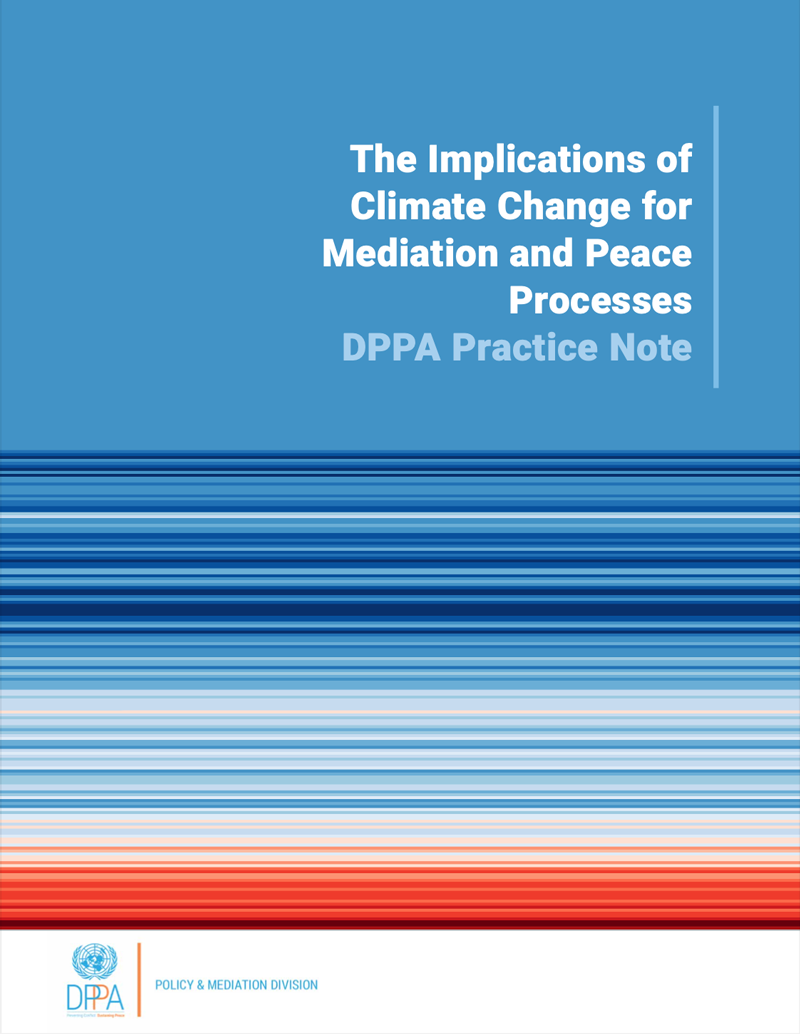The UN Department of Political and Peacebuilding Affairs (DPPA) recognizes climate change as the defining issue of our time and supports the Secretary General’s call for ambitious climate action on the part of the UN system.
Climate change poses an increasing challenge to peace, conflict prevention and mediation efforts, particularly in regions already suffering from insecurity. The effects of climate change and environmental degradation can compound other conflict drivers and even become security risks in their own right. At the same time, the shared implications of climate change may also provide incentives for conflict parties and stakeholders to come together to discuss common responses.
Climate-informed mediation and peace processes aim to incorporate climate considerations into all aspects of the peace process, mitigate risks to peace efforts arising from the effects of climate change, and create opportunities for dialogue and negotiation around shared understanding and responses.
“Today peace faces a new danger: the climate emergency, which threatens our security, our livelihood and our lives,”
UN Secretary-General Message on the International Day of Peace, 21 September 2019.
Upgrading the peacemaking toolbox
DPPA is working to develop the practice of climate-informed mediation to help provide conflict parties better support in their efforts to find a peaceful and sustainable solution to their disputes.
Integrating Climate Considerations Into UN Mediation
DPPA’s Mediation Support Unit and Climate Security Mechanism have jointly developed a practice note on integrating climate considerations into mediation processes.
Building on broader efforts to address the complex linkages between climate, peace and security, the note aims to provide guidance to mediation practitioners operating in climate-exposed and fragile contexts. It explores the opportunities and challenges of incorporating climate change considerations into all aspects of peace processes, including conflict analysis, mediation process design, the agenda and substance of peace negotiations, and peace agreement implementation.

Further resources
- Natural Resources and Conflict: A Guide for Mediation Practitioners
The guide aims to inform mediators and stakeholders addressing conflicts over natural resources - whether those disagreements are violent, have the potential to turn violent, or are part of a larger political struggle, including within a peace process. It draws on the field experiences of mediators and mediation experts.
Video: Launch event hosted by the International Peace Institute (YouTube)
- Mediating Peace with Climate Change: Integrating Climate Change Considerations into Mediation
This report is a contribution to ongoing efforts to address the impact of climate change on mediation and preventive diplomacy. It was commissioned by DPPA with support from the Government of the Republic of France and prepared by Alex Grzybowski and Chanda Hunnie of Pacific Resolutions. Views expressed in the report are those of the authors and do not necessarily reflect those of DPPA.
Operational Support
DPPA supports partners both within and outside of the UN system to conduct climate-informed mediation. This includes direct operational support to UN Special Political Missions, Peacekeeping Operations, Resident Coordinators and Peace and Development Advisers, as well as external partners such as Regional Organisations and civil society mediators, including that provided by the Standby Team of Senior Mediation Advisors.
Partners
To help integrate climate considerations into UN mediation activities, the DPPA Mediation Support Unit works in collaboration with both UN and external partners. Within the UN system, it partners with the Climate Security Mechanism, a joint initiative between DPPA, the Department of Peace Operations, the UN Development Programme (UNDP) and the UN Environment Programme (UNEP) established to help the UN system address climate-related security risks more systematically.
Through the Climate Security Mechanism, DPPA leverages extensive networks with partners across and beyond the UN system to analyze climate-related security risks and support comprehensive and climate-sensitive prevention and response strategies.
The Mechanism works with think tanks, academic institutions and practitioners from regional organizations to build up a global evidence base on climate change impacts on security and distil good practices with regard to addressing these.
